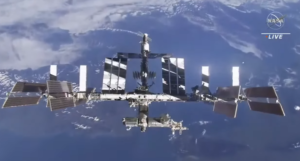Crew-7 Makes it 11
The four international astronauts of NASA’s Crew-7 mission floated through the hatch to join seven colleagues on the International Space Station this morning, bringing the crew complement up to 11 for the next several days. Crew-7 is replacing Crew-6, who will return later this week, all part of the almost 23-year history of crew rotations that have kept ISS permanently occupied since November 2000.
Crew-7 launched at 3:27 am EDT yesterday on SpaceX’s Crew Dragon Endurance from Kennedy Space Center and docked at the ISS this morning at 9:16 am EDT. Commander Jasmin Moghbeli (NASA), Pilot Andreas Mogensen (ESA/Denmark), Mission Specialist Satoshi Furukawa (JAXA) and Mission Specialist Konstantin Borisov (Roscosmos) joined the seven crewmembers already on the ISS about two hours later after the hatches between the ISS and Crew Dragon Endurance were opened following hatch pressurization and leak checks.

ESA tweeted a video of the group waving to the cameras after welcoming remarks. Crew-7 is in front: Borisov, Mogensen, Moghbeli, and Furukawa. In the row behind them, three members of Crew-6 and three who arrived on Russia’s Soyuz MS-22 and will return on Soyuz MS-23: Sultan AlNeyadi (Crew-6, United Arab Emirates), Frank Rubio (Soyuz, NASA), Sergey Prokopyev (Soyuz, Roscosmos), Woody Hoburg (Crew-6, NASA), Steve Bowen (Crew-6, NASA). Hanging upside-down: Dmitri Petelin (Soyuz, Roscosmos), Andrey Fedyaev (Crew-6, Roscosmos).
There are now 11 people from five countries on the International @Space_Station.
Follow us and @Astro_Andreas over the next six months for updates on the #Huginn mission: https://t.co/u5Vjo3hAC8
??????????? pic.twitter.com/olK6yi8Mxp— Human Spaceflight (@esaspaceflight) August 27, 2023
Crew-6 will return to Earth after a 5-day-or-so handover with Crew-7. The NASA TV schedule shows them undocking on Friday and splashing down on Saturday, but that is weather dependent. SpaceX’s Crew Dragon splashes down either in the Atlantic or the Gulf of Mexico off the coast of Florida depending on which of seven spots has the best conditions. With Tropical Storm Idalia forming in the Gulf and forecast to head towards Florida’s west coast or panhandle later this week, they may have to wait a little longer.

Rubio, Propokyev and Petelin will return to Earth on September 27. Crews usually rotate on 6-month schedules, but they pulled a double shift because their Soyuz MS-22 spacecraft leaked all its coolant into space. Their replacements were to arrive in March on Soyuz MS-23, but Russia decided to send that spacecraft up empty so it could be used to safely return the Soyuz MS-22 crew to Earth. That meant the Soyuz MS-23 crew has had to wait for the next rotation. They are scheduled to launch on Soyuz MS-24 September 15 (Oleg Kononenko and Nikolai Chub from Roscosmos and Loral O’Hara from NASA).

Rubio, Propokyev and Petelin will have spent 370 days in space, joining the tiny group of people who have continuously (not cumulatively) spent a year or more in space. The record of 438 days was set by Russian cosmonaut Valeriy Polyakov in 1994-1995. He and three other Russians — Sergei Avdeyev (380 days, 1998-1999) and Vladimir Titov and Musa Manarov (366 days, 1987-1988) — are the only members now.
Rubio will be the first American to break the 365-day record. Mark Vande Hei currently holds the U.S. record for longest continuous time in space, 355 days, in 2021-2022. He and Russian colleague Pyotr Dubrov also pulled a double shift because of operational requirements, but knew before they left Earth that it was a good possibility. It was unexpected for Rubio and his crewmates.
The International Space Station is a partnership among the United States, Russia, Japan, Canada and 11 European countries working through ESA.

Crews launch on either Russian or American spacecraft. Each crew has at least one Russian and one American so one of each nationality is always aboard to operate the Russian Orbital Segment and the U.S. Orbital Segment (which includes modules from Europe and Japan and the Candarm2 Remote Manipulator System from Canada).
User Comments
SpacePolicyOnline.com has the right (but not the obligation) to monitor the comments and to remove any materials it deems inappropriate. We do not post comments that include links to other websites since we have no control over that content nor can we verify the security of such links.